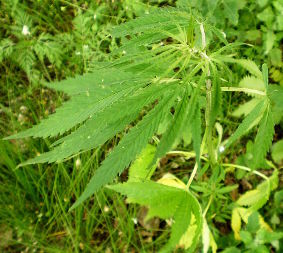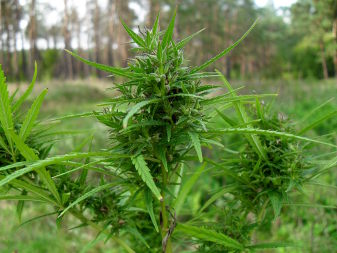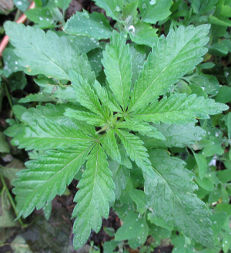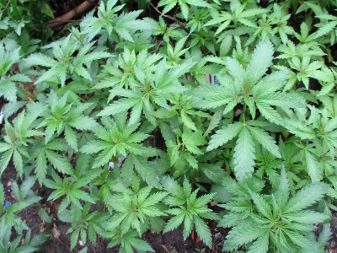



Wild Hemp (Cannabis ruderalis), fam. Cannabinaceae.
Occurs as an unpretentious weed among the private sector of DVRZ suburb, and in the forest, mostly around Rybne suburb and the adjoining lakes.
Surely, when hearing the word "hemp", most people have suspicious thoughts… Indeed, so often we see the news that its plantation has been detected and destroyed somewhere. But here hemp just grows wildly… Don't be afraid, there is nothing criminal. In our nothern climate, it is difficult to grow hemp rich in notorious narcotic substances, and it would be especially hardly probable for the wild varieties to be like that.
Overall, hemp is quite similar to stinging nettle –
1) the habit (both are tall and mighty herbs, with serrated hairy leaves),
2) dioecious (the male and female hemp plants differ from one another escpecially strongly, which is rare among the plant world),
3) place of grows (they like sunny lakesides),
4) their traditional use as a source of fiber,
5) edibility (hemp seeds are completely legally sold in the markets – they are rich in protein and fat, etc.),
6) the smell (nettles have intensively grassy one; hemp has a stupefying smell, with a tint of hazelnuts).
External and internal application of hemp seeds and unheated oil has antiinflammatory action, improves the skin and hair condition. The seeds contain such components as phytin and meso-inositol. Some people consider them beneficial, as they chelate radionuclides and heavy metals to excrete them from the body. Unfortunately, these substances also bind to essential minerals, calcium and zinc. Overall, the excess of phytic acid in the modern man's diet is a serious problem, being one of the root causes of highly abundant caries, osteoporosis and immune insufficiency. That is why grains, especially with bran, are not really healthy product; without careful preparation by long soaking, sprouting or fermentation their minerals are mostly left unavailable for the body. Quite probably, the same is true for hemp seeds.